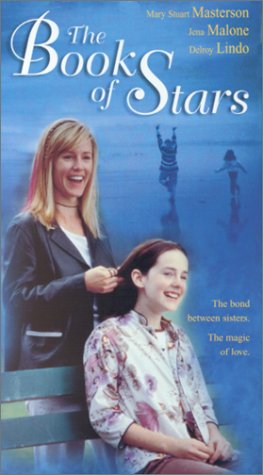A TAVERN REVIEW
THE BOOK OF STARS

Ozzy Smith was one of the best shortstops to ever play the game of
baseball. He had soft hands, quick reactions, and incredible
range in the field. No ground ball hit anywhere near his
position was likely to get through the infield. Why start off a
review of a Mary Stuart Masterson movie by refering to the now
retired great St. Louis Cardinal shortstop? Because range is
something I will always associate with Ms. Masterson: Range of
Emotion in a performance. She has few peers in emotional range, but
in The Book of Stars, Jena Malone seemed to be taking on some
of that talent from her older colleague.
Mary Stuart Masterson and Jena Malone play sisters who lost their
parents when they were younger. At one point in her life, Mary
Stuart's character, Penny, had written a book of poetry centered
around the theme of the sun's rising and setting. The book was
published, and was quite popular for awhile. After the death of their
parents, Penny and Mary (Jena Malone's character) were placed briefly
in foster homes, but lived on their own with the money from Penny's
book and their parent's estate. With their family shattered, Penny
then learns that her younger sister has cystic fibrosis, a
progressive disease of the lungs that is always fatal. Soon the money
from the book and the parents' estate runs out, so Penny secretly
turns to prostitution to help support her sister. Medicare helps pay
for Mary's care at a clinic.
Penny has given up on both the present and the future. She has
only her past, with her parents and Mary in a house built on stilts
near the beach, where they lived all year. When she is especially
sick, Mary likes to have Penny tell her about the days when they
lived on the beach. Mary collects clippings of photos, and makes her
own drawings, which she keeps in a scrapbook she calls "The Book of
Stars." She includes drawings and photographs of her and Penny, their
friends, and about an astronaut who is struggling to repair his craft
in space to avoid spinning off and crashing into the sun.
The cystic fibrosis has stunted Mary's growth. She is within days
of being sixteen, but looks much younger. She likes to tend plants
for an older man who has befriended the two sisters, whom they refer
to only as "The Professor" (Delroy Lindo). One morning, Mary is
watering some of the plants on the windowsill of their modest
apartment, when she spills water on a young man who is in the process
of moving into their building. His reaction makes him memorable to
Mary, and when she finds that he has a job in the pharmacy where
Penny gets her prescriptions from the clinic filled, Mary invites him
to dinner. It is the beginning of a warm friendship between Mary and
the young man, named Christian, who is from one of the Balkan
countries ravaged by civil war. His village was destroyed and his
family gone missing. He was wounded and walks with a limp. Though he
struggles with English, he seems to understand the tragedy of the two
sisters through his own past suffering. Penny avoids him at first,
and is suspicious of him at first.
Yet another person with a tragic past comes into Mary's world when
she finds a letter addressed to Penny with a return address of a
prison. Penny refuses to read the letter, but Mary does. It is from a
convict who has found solace in Penny's old book of poetry. Since
Penny will not write back, Mary does, signing her sister's name. A
correspondence developes between them.
Mary's condition worsens throughout the film. This is not the
nameless "Hollywood disease" that killed Ali McGraw in "Love Story."
This is a real fatal disease, and Jena Malone does an excellent job
in portraying the debilitating effects and conveying the sense of
loss the character feels. Mary Stuart Masterson gives the audience a
clear vision of a young woman who has lost all hope in the wake of
losing her parents, and now having to watch her sister die. The
hopelessness has destroyed her talent for poetry, and has caused
Penny to use drugs to ease her emotional pain.
Penny promised Mary a trip to their former home on the beach for
her birthday. The two sisters will not get there together, but Mary's
"Book of Stars," the friendship of Christian, and an encounter with
the convict, who finally wins his parole, make the seeds of
hope that Mary planted in her sister finally take root and grow. I
emphasize the word "seeds" as there is a scene in a park where Penny
encounters Mary and Christian having a picnic where something about
seeds comes into the conversation. It doesn't seem important when you
first watch it.
Keep a box of Kleenex handy when you watch this one. I had a
little trouble getting through it, but you better see it if you want
to see Mary Stuart Masterson at the TOP OF HER GAME. Someday these
smaller independent films will get a serious look from the judges at
the Academy Awards. There was more real acting on display in this
movie than in just about any of the big blockbusters I saw this
summer. Oh, well, they're going to do a sequel of Silence of the
Lambs. I suppose they prefer another romp with a cannibal to
something uplifting.
 SOME NOTES ABOUT THE BOOK OF STARS
SOME NOTES ABOUT THE BOOK OF STARS
Mary Stuart Masterson provides the voice-over narration at the
beginning and end of the movie.
D.B. Sweeney plays the convict who corresponds with Mary,
believing she is Penny. D.B. Sweeney was Mary Stuart Masterson's
husband in the 1987 film Gardens of Stone.
The movie was filmed on location in the Seattle, Washington area,
with the beach scenes shot at Ocean City National Park in Washington.
Jena Malone was first known as a great new talent by television
reviewers who saw her in the TNT Original production of "Hope," a
film about the early days of the Civil Rights movement in the South.
The television movie was the directorial debut of actress Goldie
Hawn. So far, everything Jena Malone has been in has been a "keeper."

